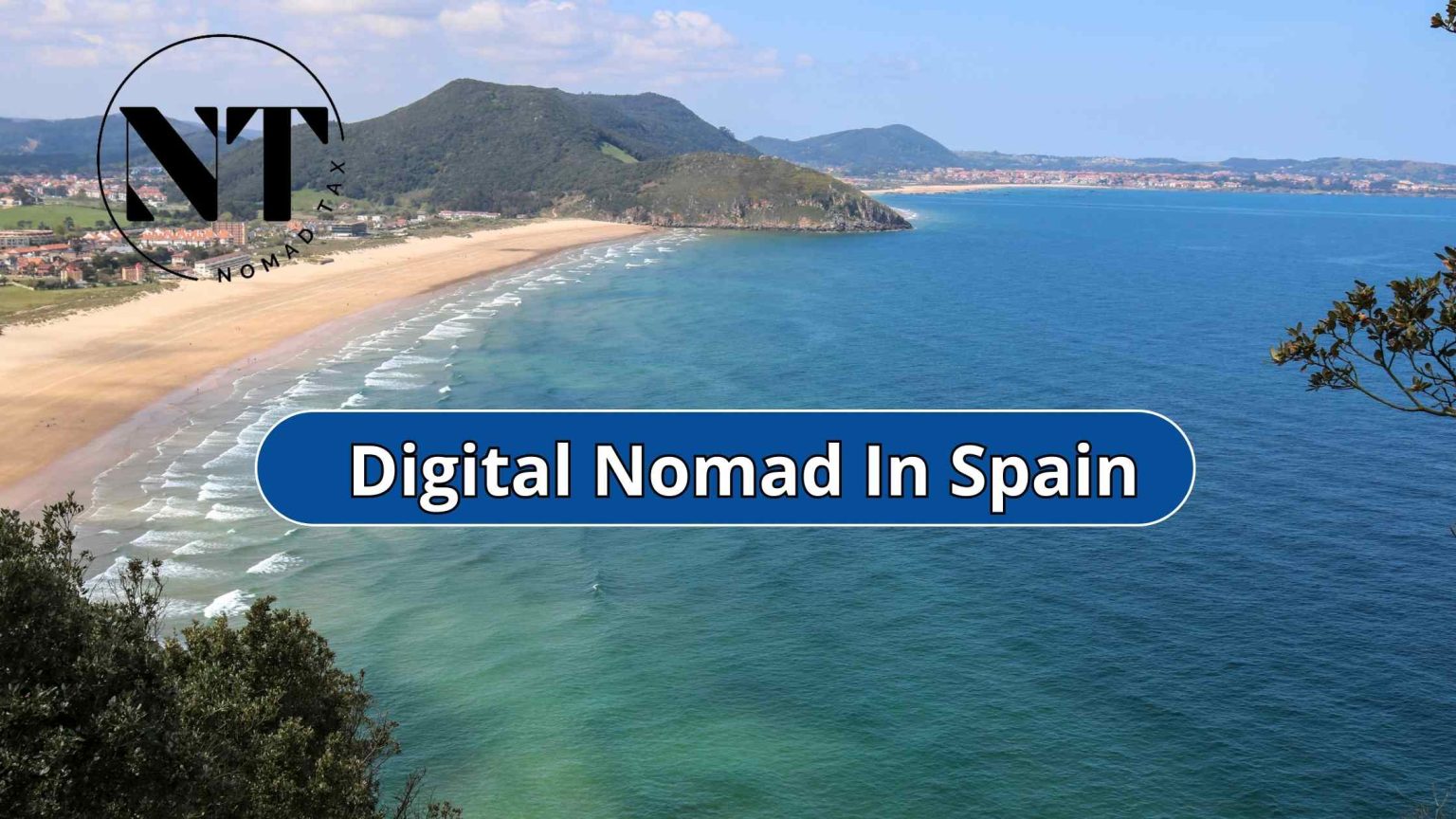We’ve been thinking for a while about writing an article perfect for you Nomad, who wants to travel and move around the Mediterranean, setting up your base in a place with affordable prices, good food and good people. You are in luck for having arrived to this complete guide. Enjoy it.
Indice del artículo
The importance of the digital nomad in Spain
In this article, we will comprehensively address everything you need to know about the requirements for the digital nomad visa in Spain. You will discover the conditions and benefits of this visa, as well as some useful tips to ensure a successful transition.

What are the requirements to apply for the digital nomad visa in Spain?
The digital nomad visa in Spain is available for both freelancers and remote workers. If you are a freelancer, your employer must be outside Spain, and you can only earn a maximum of 20% of your income from Spanish clients.
If you are a remote employee, there are additional criteria you must meet. You must have been employed for at least 3 months in the same company before applying. If you have a university degree in the field you work in, the work experience requirement is fulfilled with these 3 months of employment. However, if you do not have a university degree, you must have at least three years of experience in that field.
Additionally, the company you work for must have been active for at least one year and allow you to live in Spain. To ensure that you contribute to the country’s economy, you are required to have a monthly salary or income equivalent to at least two minimum wages in Spain.
The digital nomad visa in Spain gives you the opportunity to work remotely in a beautiful and multicultural environment. Spain is known for its quality of life, favorable climate, and rich culture. Obtaining this visa will allow you to enjoy all the benefits of living in a fascinating country while working efficiently and legally.

What taxes do digital nomads pay in Spain?
When you spend more than 183 days a year in Spain, you are considered a tax resident according to tax laws. However, even if you spend less than those 6 months, but your economic or professional activity is in Spanish territory, you will also be considered a tax resident. As a holder of a digital nomad visa, you need to spend at least 183 days a year in the country to be able to renew your residence, which implies becoming a tax resident.
This has important tax implications, but as we will see, the new visa presents great advantages in this regard. The most significant implication is that, as a tax resident, you are obliged to pay taxes in Spain, just like any other Spanish citizen. Regarding the Personal Income Tax, for example, this means that you must pay taxes on the income you generate worldwide, both in Spain and in other countries. This fact is especially relevant for digital nomads, as they work remotely and may have clients or employers in different countries.
In general, the applicable Personal income tax is a progressive tax that varies according to your income and can go up to 50% (depending on the region, as some Autonomous Communities in Spain offer lower tax rates). However, one of the advantages of obtaining the digital nomad residence is that you will only be subject to a fixed tax rate, which is considerably lower. This means you can benefit from reduced tax burden compared to other taxpayers.
Tax brackets for digital nomad visa in Spain
Nomads holding a specific visa (BECKHAM VISA) are in a different tax situation, as they are not considered tax residents in Spain for tax purposes. This means they are subject to a fixed tax rate of 24% only on income generated in Spanish territory, without having to pay taxes on their worldwide income. This fixed tax rate applies up to an amount of €600,000, instead of reaching 50% as in other cases.
In case income exceeds that amount, the fixed tax rate would be 47%.
Moreover, it is essential to consider the tax rate applicable to capital gains, which includes the sale of shares, properties, interests, or participations.
In these cases, digital nomads would be subject to the following tax rates:
- 19% for gains up to €6,000
- 21% for gains between €6,001 and €50,000
- 23% for gains between €50,001 and €200,000
- 27% for gains between €200,001 and €300,000
- 28% for gains starting from €300,001
These specific tax rates provide digital nomads with greater clarity regarding their tax obligations in Spain. Being a different tax regime than that of residents, fixed rates are established, simplifying the taxation process for this group of remote workers.
It is essential to fulfill the corresponding tax obligations and consult with a specialized tax advisor to ensure proper compliance with the tax rules applicable to digital nomads in Spain.
How to apply for the digital nomad visa in Spain?
Once you have met all the requirements and are ready to apply for the digital nomad visa in Spain, it is important to follow the correct steps to ensure a successful application. You can submit your application at the Spanish embassy in your country of origin, where it will be issued for a period of 1 year, or you can also apply directly in Spain, which will allow you to obtain it for a period of 3 years.
While the digital nomad visa in Spain offers an initial period of 1 or 3 years, it is important to remember that it can be renewed subsequently for additional periods. After having lived in Spain for 5 years, you can also apply for permanent residency, which may open even more doors and opportunities in Europe.
You should be aware that if you decide to opt for it and apply for a digital nomad visa, after it is approved, which usually takes 3-4 weeks, you will need to take some additional steps to finalize the process. I mention this because many people think that having an approved permit is all there is to it. Immigration will simply issue a plastic card later, and you will collect it. However, it is not like that in Spain.
So, you have finally received the long-awaited approval for taxes and migration. Congratulations! Now, the question arises:
Steps to follow to apply for a nomad visa in Spain
In this section, we will guide you through the essential steps you should take after receiving your approval to ensure a smooth transition. From providing your fingerprints to registering with the necessary authorities, we’ve got you covered. Let’s delve into the details!
- Provide your fingerprints to the police Within 30 days of receiving your approval. This step can only be completed in the province where you reside. To schedule an appointment, you will need a Spanish phone number. Remember that completing this requirement on time is essential for further procedures.
- Fill out the appropriate form and pay the fee Before visiting the police station, make sure to fill out and print the appropriate form. Additionally, you will need to pay a fee of 16 euros. This payment is an integral part of the process, so make sure to follow the instructions carefully to avoid delays.
- It is important to note that in most regions, except Barcelona and Madrid, you will need a residence permit for the fingerprinting process. Pay attention to the differences in the entry procedures for fingerprints, as indicated on the second page of your approval document. Familiarize yourself with the specific requirements according to your location to ensure a smooth experience.
- Registration with Gestoría and Social Security If you have applied as a freelancer, self-employed worker, or sole proprietor with a service contract, it is necessary to register with the Gestoría. This registration process involves both registering as self-employed and joining the Social Security. These organizations are also responsible for handling tax-related matters. Make sure to complete this step to comply with relevant legal requirements.
- Deadline and start of work in Spain While there is no defined deadline to complete the aforementioned procedures, the obligation you sign when applying states that they must be done before you start working in Spain. Fulfilling this requirement ensures a smooth transition and avoids complications. Therefore, it is advisable to complete the necessary steps in a timely manner.
- Collect your residence permit card Approximately 40 to 45 days after providing your fingerprints, you can expect to receive your residence permit card. In most cases, the card will be issued at the same office where your fingerprints were taken. However, note that in some offices, a separate registration may also be required for this procedure. Keep track of the schedule and make sure to collect your residence permit card promptly.
- Open a bank account Once you have obtained your residence permit card, you can proceed to open a bank account in Spain. This step is crucial for managing your financial affairs and facilitating various transactions. Choose a reputable bank and gather the necessary documents to complete the account opening process smoothly.
IN CONCLUSION
In conclusion, the digital nomad visa in Spain offers a unique opportunity for those who wish to work remotely and enjoy everything this beautiful country has to offer. Applying for this visa can be an exciting and rewarding process, but it also requires diligence and compliance with the established requirements.
It is important to consider the tax obligations associated with the digital nomad visa, both in Spain and your home country. Consulting with tax professionals will help you fully understand your responsibilities and properly plan your financial situation.
If you need the assistance of an expert advisor, do not hesitate to contact us for more information.
Learn about us on our Youtube channel
FAQs
- How can I apply for the digital nomad visa in Spain?
To apply for the digital nomad visa in Spain, you must meet the requirements established by the Spanish authorities. These requirements may include demonstrating sufficient stable income, medical insurance, personal documentation, and payment of the corresponding fees apart from filling out the appropriate form.
- What are the taxes for the digital nomad visa in Spain?
Nomads holding the BECKHAM VISA in Spain have a unique tax status. They are not considered tax residents and are subject to a fixed tax rate of 24% on income generated in Spain, up to €600,000. If their income exceeds this, the rate becomes 47%. Capital gains, including sales of assets, are taxed at different rates depending on the amount. These fixed tax rates simplify taxation for digital nomads and provide clarity on their tax obligations. However, it’s crucial to meet tax requirements and seek advice from a specialised tax advisor for proper compliance.
- What are the requirements for the digital nomad visa in Spain?
The requirements for the digital nomad visa in Spain can vary, and it is important to stay updated with the current regulations. In 2023, some possible requirements may include demonstrating stable and sufficient income, medical insurance, a work or professional activity plan, and the ability to work remotely. We recommend consulting with Spanish immigration authorities or the Spanish consulate/embassy in your country to obtain accurate and up-to-date information on the requirements to apply for the digital nomad visa in Spain in 2023.



